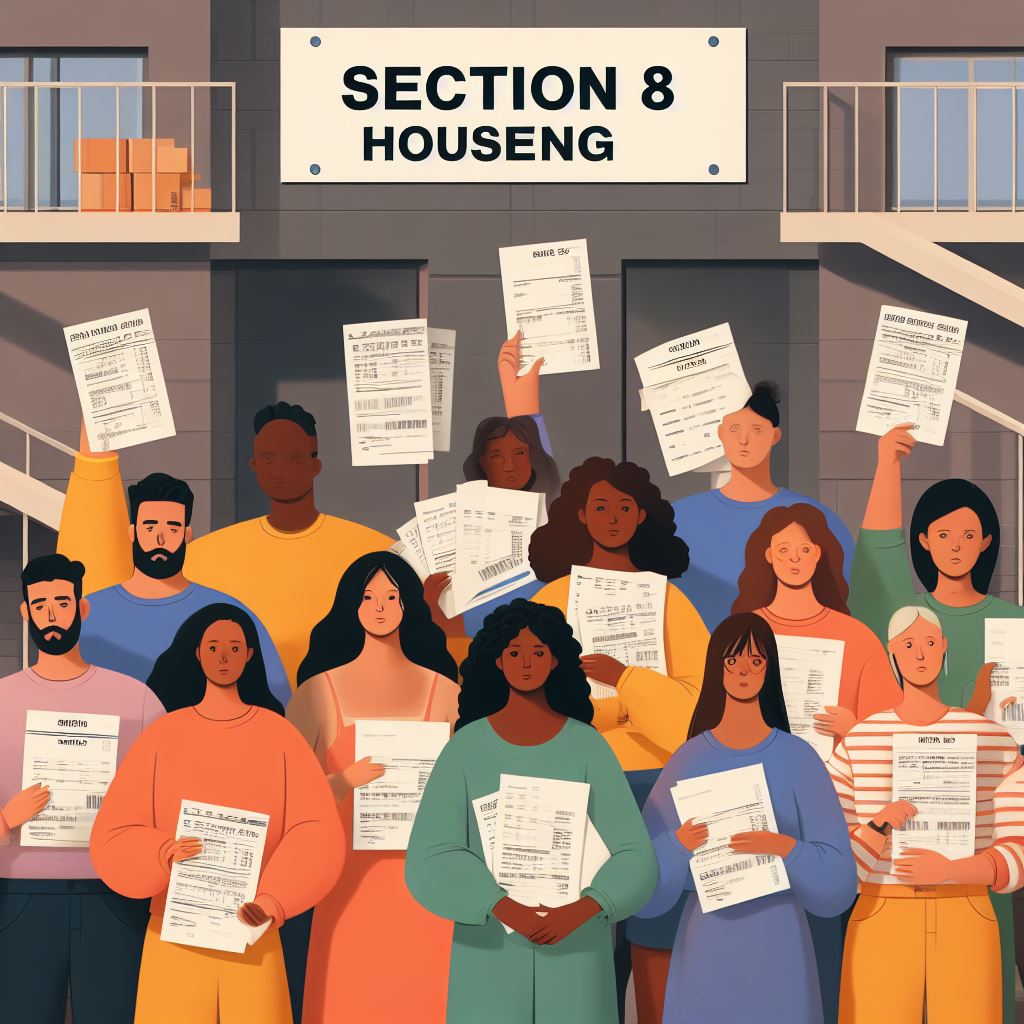Understanding Section 8 Housing Income Requirements

Did you know that over 2.2 million low-income families in the United States rely on Section 8 housing assistance?
Understanding the income requirements for Section 8 housing is crucial if you’re looking for affordable housing options.
In this article, we will break down how your income is calculated, the limits you need to meet, the necessary documentation, and even some exceptions to the requirements.
Stay tuned for valuable tips on how to meet the income requirements and secure the housing you need.
Key Takeaways
- Income is calculated using a specific formula that considers various sources of income.
- Income limits are set by the Public Housing Authority (PHA) based on the median income of the area and can vary depending on the size of the household.
- Specific documentation is needed to verify income for Section 8 housing eligibility, including pay stubs, bank statements, tax returns, and proof of other sources of income.
- Exceptions to income requirements can be granted in certain circumstances, such as for elderly and disabled individuals receiving certain types of income or for individuals or families experiencing a sudden and unexpected decrease in income.
How Income Is Calculated
To determine your eligibility for Section 8 housing, your income is calculated using a specific formula. This formula takes into account various sources of income, including wages, self-employment income, Social Security benefits, and any other form of monetary compensation. The goal is to accurately assess your financial situation and determine if you meet the income requirements for the program.
First, your gross income is calculated. This includes all income before any deductions or taxes are taken out. It’s important to note that certain deductions, such as child care expenses or medical expenses for elderly or disabled family members, may be subtracted from your gross income to arrive at your adjusted income.
Next, the Public Housing Authority (PHA) will consider the size of your household. The income limits for Section 8 housing vary depending on the number of people in your family. The PHA will compare your adjusted income to the income limits to determine if you fall within the eligible range.
It is worth mentioning that income calculations for Section 8 housing are reviewed annually. This means that any changes in your income or household size should be reported to the PHA promptly. Failure to do so may result in a loss of eligibility or even termination from the program.
Understanding how your income is calculated for Section 8 housing is crucial in determining your eligibility and maintaining compliance with the program’s requirements. By providing accurate and up-to-date information to the PHA, you can ensure that you receive the assistance you need.
Income Limits for Section 8 Housing
To determine if you meet the income requirements for Section 8 housing, you must be aware of the specific income limits set by the Public Housing Authority (PHA). The PHA establishes income limits for each geographic area based on the median income of that area. These limits are designed to ensure that Section 8 housing is provided to those who truly need it.
The income limits for Section 8 housing vary depending on the size of your household. Generally, the lower your income, the more likely you’re to qualify for assistance. The PHA sets different income limits for households of different sizes, ranging from one person to eight or more people.
It is important to note that the income limits for Section 8 housing aren’t fixed and can change annually. The PHA takes into account factors such as inflation and changes in the local economy when adjusting the income limits. Therefore, it’s essential to stay updated on the current income limits to determine your eligibility for Section 8 housing assistance.
To find out the income limits for Section 8 housing in your area, you can contact your local PHA or visit their website. They’ll provide you with the most accurate and up-to-date information regarding income limits and eligibility criteria.
Required Documentation for Income Verification
You will need to provide specific documentation to verify your income for Section 8 housing eligibility. The purpose of income verification is to ensure that individuals and families who qualify for Section 8 assistance are truly in need of affordable housing.
The required documentation varies depending on your specific circumstances, but generally includes recent pay stubs, bank statements, tax returns, and proof of other sources of income such as Social Security benefits or child support. It’s important to gather all necessary documents before applying for Section 8 housing to avoid delays in the application process.
Additionally, if you’re self-employed, you may need to provide additional documentation like profit and loss statements or business income tax returns. Keep in mind that the income verification process may also include contacting your employer or financial institutions directly to confirm the information provided.
It’s crucial to be honest and accurate when submitting your income documentation, as any misrepresentation may lead to disqualification or legal consequences. By providing the required documentation, you can demonstrate your eligibility for Section 8 housing and increase your chances of securing affordable housing assistance.
Exceptions to Income Requirements
Exceptions to the income requirements for Section 8 housing eligibility can be granted in certain circumstances. While the program generally has strict income limits, there are situations where exceptions can be made. These exceptions are designed to ensure that individuals and families who are truly in need of affordable housing aren’t unfairly excluded from the program.
One common exception is the elderly and disabled individuals who receive certain types of income. For example, if you’re 62 years or older, or disabled, and receive income from sources such as Supplemental Security Income (SSI) or Social Security Disability Insurance (SSDI), you may be eligible for Section 8 housing even if your income exceeds the normal limits. This recognizes that these individuals may have limited earning capacity due to their age or disability.
Another exception is for individuals or families who experience a sudden and unexpected decrease in income. This could be due to job loss, reduction in work hours, or other unforeseen circumstances. In such cases, you may be able to qualify for Section 8 housing even if your current income exceeds the limits, as long as you can demonstrate that the decrease in income is temporary and you’re actively seeking employment or taking steps to improve your financial situation.
It is important to note that the decision to grant an exception to the income requirements is made on a case-by-case basis by the housing authority. They’ll consider factors such as the severity of the individual or family’s need for assistance, the availability of funds, and the overall demand for Section 8 housing in the area.
Tips for Meeting Section 8 Housing Income Requirements
One way to ensure you meet Section 8 Housing income requirements is by carefully managing your finances. Here are some tips to help you meet these requirements and increase your chances of qualifying for Section 8 Housing assistance.
Firstly, it’s important to accurately report all sources of income. This includes wages, tips, social security benefits, child support, and any other form of income you receive. Be sure to provide all necessary documentation, such as pay stubs or benefit statements, to support your income claims.
Additionally, it’s crucial to budget and prioritize your expenses. This means keeping track of your monthly income and expenditure, and making sure your housing costs don’t exceed the maximum allowable amount set by Section 8. By carefully managing your finances, you can ensure that you have enough income to meet the requirements and afford your rent.
Furthermore, it’s advisable to seek financial counseling or assistance if needed. There are many organizations and resources available that can help you with budgeting, debt management, and improving your financial situation. Taking advantage of these services can provide you with valuable guidance and support in meeting the income requirements for Section 8 Housing.
Frequently Asked Questions
Can I Include Income From Sources Other Than Employment, Such as Child Support or Disability Benefits, When Calculating My Income for Section 8 Housing?
Yes, you can include income from sources other than employment, such as child support or disability benefits, when calculating your income for Section 8 housing. It’s important to accurately report all sources of income.
Are There Any Deductions or Exemptions Available for Certain Expenses, Such as Medical Costs or Childcare Expenses, When Determining My Eligibility for Section 8 Housing?
Yes, there are deductions and exemptions available for certain expenses, like medical costs and childcare expenses, when determining your eligibility for Section 8 housing. These deductions can help lower your overall income.
What Happens if My Income Exceeds the Income Limits for Section 8 Housing After I Have Already Been Approved for Assistance?
If your income exceeds the Section 8 housing income limits after approval, you may no longer be eligible for assistance. It is important to report any changes in income to your housing authority immediately to avoid potential consequences.
Are There Any Circumstances Where I May Be Eligible for Section 8 Housing Even if My Income Exceeds the Maximum Limit?
Even if your income exceeds the maximum limit for Section 8 housing, you may still be eligible under certain circumstances. These exceptions include disability status, elderly status, or if you are a veteran.
Can I Provide Alternative Documentation for Income Verification if I Don’t Have the Required Documents Mentioned in the Article?
Yes, you can provide alternative documentation for income verification if you don’t have the required documents mentioned in the article. This allows for flexibility in the income verification process.



